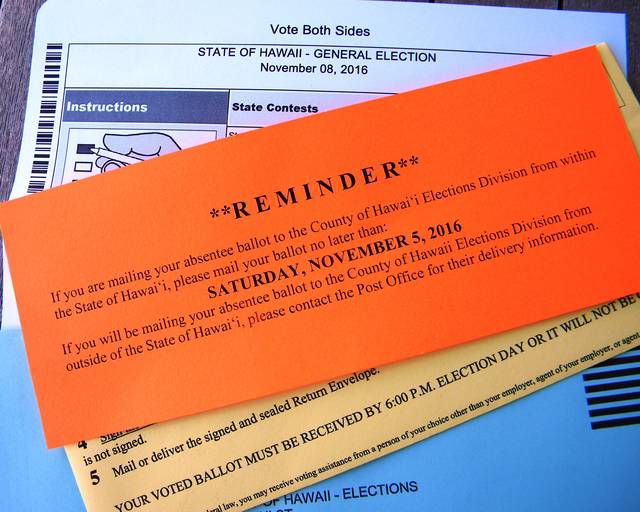The Charter Commission will consider holding a special election later this year, rather than adding charter amendments to a 2020 general election ballot already crowded with candidates for president, Congress, county mayor, prosecutor and County Council.
The question whether to dispense with the proposed amendments more quickly was posed by Commission Chairman Doug Adams, who noted the commission will complete its work by the end of August, leaving 15 months between when the public participated in drafting amendments and when they’d see them on the ballot.
“It is more of an issue to me, is we would be sitting around with this stuff for a year, doing what with it?” Adams said at the commission’s March 8 meeting, asking the topic be put on the agenda for the April meeting.
That meeting’s set for 9:30 a.m., April 25, in Hilo council chambers, with videoconference attendance available and testimony accepted from the West Hawaii Civic Center.
“So it has occurred to me that maybe we should try and establish a special election maybe in November of 2019,” Adams added. “One that allows for folks that have been paying attention to know that it is going to be held reasonably close to when it would be done and through the council and back.”
The commission has the legal authority to hold a special election to put charter amendments on the ballot. An election could be held either November 2019, or in early 2020, giving the county clerk and elections staff more time to create an informational brochure and provide voter outreach.
If the commission decides to go ahead with a special election, it would be a mail-in ballot, said Elections Division Administrator Pat Nakamoto. She couldn’t estimate voter turnout, which is often low during special elections.
While turnout has been high with mail-in ballots — some 80 percent of ballots mailed out last year were returned — that’s because the ballots were originally requested by the voters. It’s difficult to say how many ballots would be returned in an election where they’re not requested in advance.
Special elections are handled by the county without state involvement, unlike regular elections, where the chief election officer of the state supervises the election.
Nakamoto estimates a special election by mail-in ballot would cost the county about $450,000.
“This would be a cost for the county only and not be a shared cost with the state,” Nakamoto said.
Adams, citing concerns about the state Sunshine Law, declined Thursday to offer more detail or state his opinion on the timing of the election.
“I brought it up at the last commission meeting (but) we haven’t had a conversation as a commission,” Adams said.



